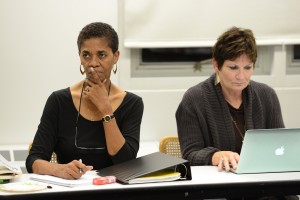About
Requirements
Admissions
Procedures for Students in the Cooperative M.Div
Start Your Master of Divinity in an Interreligious Context
While engaging in studies in traditional areas of Christian ministry, Cooperative Master of Divinity Students will learn together with colleagues from other religious traditions, developing knowledge and building skills for ministry in a multifaith world, before moving on to complete degrees at Yale Divinity School, Boston University School of Theology, Drew Theological School or Chicago Theological Seminary’s online program. Cooperative M.Div. students take full advantage of Hartford’s one-of-a-kind setting where students from all over the world study, pray, and prepare for public ministry together.
Here’s how it works: Hartford Seminary has cooperative agreements with Yale Divinity School, Boston University School of Theology, Drew Theological School and Chicago Theological Seminary’s online program that allow Cooperative M.Div. students to begin their studies at Hartford Seminary and, if accepted, to proceed to any of the partner seminaries to complete their Master of Divinity (M.Div.) degree. These cooperative agreements allow students to transfer up to 36 credits of coursework. Students wishing to complete M.Div study at other seminary or divinity schools should be aware of the policies and requirements of individual institutions.
The Ministerial Studies curricula is designed to provide the opportunity for Cooperative M.Div. students to take advantage of Hartford Seminary’s interreligious context and transfer in a maximum of 36-credits toward an M.Div. degree. Students will not complete their degree at Hartford Seminary, but will be awarded a “Certificate of Ministerial Studies” when they transfer. They will then complete their M.Div. degree at one of the partner institutions.
In general, any student choosing to pursue the Cooperative Master of Divinity pathway should to be aware of the following:
- Students will apply to the Master of Arts in Interreligious Studies program, indicating their interest in the Ministerial Studies specialization and their intent to transfer to a partner institution.
- Once matriculated, students should meet with the Academic Dean for an advising session regarding their intention to apply to a partner institution.
- Before applying to either Yale Divinity School (YDS) or Boston University School of Theology (BU) through the Cooperative M.Div. pathway, the student must be in good standing and must have completed at least 24 credits at Hartford Seminary. At least 12 of the 24 credits must have been earned in courses taught by at least two different core faculty or faculty associates.
- When applying to any of our partner institutions, a letter of reference will be supplied by the Academic Dean’s office, as one of the required recommendation letters.
- For students intending to matriculate to YDS, be aware that YDS will not transfer in week-long intensive courses taken at Hartford Seminary during the January or June terms. Similarly, YDS will not transfer in any asynchronous courses taken online.
On-Campus Requirement
Students intending to transfer to a Cooperative M.Div. partner institution should plan to take all of the courses that make up the Ministerial Studies curricula of their degree at Hartford Seminary. Occasionally it will be appropriate for students in this program to consider courses taught in other formats, e.g., off-site courses, travel seminars, or independent study. When appropriate, the student should discuss the merits of these alternatives with his/her Hartford Seminary advisor. The Dean’s approval is required, however.
Advising Guidelines
Advising guidelines are intended to help students in the Cooperative M.Div. pathway make informed choices about the courses they should take at Hartford Seminary that will satisfy curricular requirements at each institution. Thus, the Ministerial Studies specialization is intended to provide a clear pathway for students to transfer the maximum 36 credits to their M.Div. degree. Students should be aware, however, that whether or not a Hartford Seminary course will meet a specific area requirement is a determination that is finally in the hands of each partner institution, and that decision is made after the student has applied and been admitted. These guidelines are a reliable guide of equivalency, but not guarantees. Course offerings and degree/curricular requirements (or configurations) at all institutions change over time; therefore, this chart will be periodically updated by Hartford Seminary. Students should check the website for the most recent version of these documents.
BU Advising Guidelines (updated 2021)
CTS Advising Guidelines (updated 2021)
Drew Advising Guidelines (updated 2021)
YDS Advising Guidelines (updated 2021)
Applicants to the Cooperative Master of Divinity program follow the admissions requirements for the Master of Arts in Interreligious Studies with the Ministerial Studies specialization.
In their statement of purpose they should indicate their in their goal of transferring to a partner institution to complete the degree.
Start your Application Below
Hartford Seminary has cooperative agreements with Boston University School of Theology (BU), Drew Theological School (DTS), Chicago Theological School (CTS), and Yale Divinity School (YDS) that allow qualified Master of Arts in Interreligious Studies (M.A.) students to begin their studies at Hartford Seminary and, if accepted, to proceed to either of the partner seminaries to pursue a Master of Divinity (M.Div.) degree. Students may take advantage of this special cooperative relationship and agreement by following the process and procedures outlined below.
Please Note: Hartford Seminary students may, at any time, apply on their own directly to any of the partnering schools. Being, or having been, a student at Hartford Seminary does not inhibit this. However, if a Hartford Seminary M.A. student wishes to receive the benefit of the special cooperative agreements with these institutions, the condition, procedures and process detailed below will apply and must be followed.
1. Before making an application to a partnering school through the Cooperative pathway, the student should meet with the Academic Dean for an advising session. In addition, the student must be an M.A. student in good standing and must have completed at least 24 credits at Hartford Seminary. At least 12 of the 24 credits must have been earned in courses taught by at least two different core faculty or faculty associates.
2. As a part of the student’s application to a partner M.Div institution, Hartford Seminary will:
- Provide a letter of recommendation from the Dean’s office on behalf of the Hartford Seminary, specifically with the student’s M.Div. aspirations in mind. The student will not have access to this letter, unless the student has stipulated in advance to the professor that s/he be given access.
- If requested, the student may request another core faculty or faculty associate provide a second letter of recommendation to support the student’s application to the partnering school.
- A copy of the student’s transcript from Hartford Seminary, officially requested by the student to be sent to the partner institution (the normal transcript fee will be waived).
3. The Application deadlines for submitting materials to the each institution are as follows:
| Fall Semester Admission | Spring Semester Admission | |
| Boston University | January 15 – July 15 | October 15 |
| Chicago Theological Seminary | February 15 | November 30 |
| Drew Theological School | April 1 | October 1 |
| Yale Divinity School | January 15 | No spring admission |
5. When a student does matriculate to one of the cooperating seminaries and transfers their credits into a M.Div. program, they are no longer matriculated in a degree program at Hartford Seminary.
6. Students accepted into and enroll in the M.Div. program at a partnering school, will receive a “Certificate of Ministerial Studies” from Hartford Seminary. Students must complete the Graduation Form online, and advise the Registrar if they will attend graduation.
7. Students should follow the Ministerial Studies curricula, under the guidance of their advisor at Hartford Seminary, to maximize the courses 36 credit-hours that will be transferable. It is important to keep in mind, however, that the final determination of which courses will be transferred, and toward what curricular requirements, rests with the partnering schools who will be the degree granting institution.
8. If, for any reason, a student is not accepted into a partner institution, does not matriculate, or decides not to transfer, they may still complete the final requirement of the Ministerial Studies specialization and graduate with a Master of Arts in Interreligious Studies at Hartford Seminary.
 Sign-up now ›
Sign-up now ›